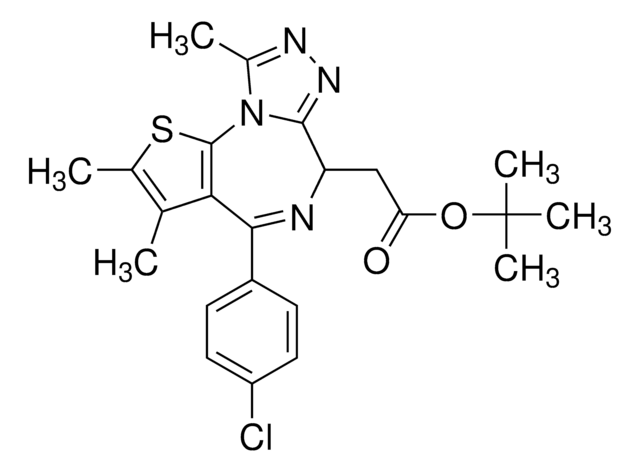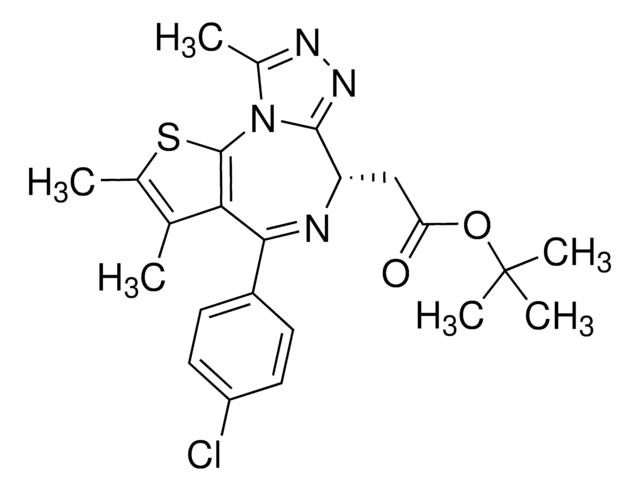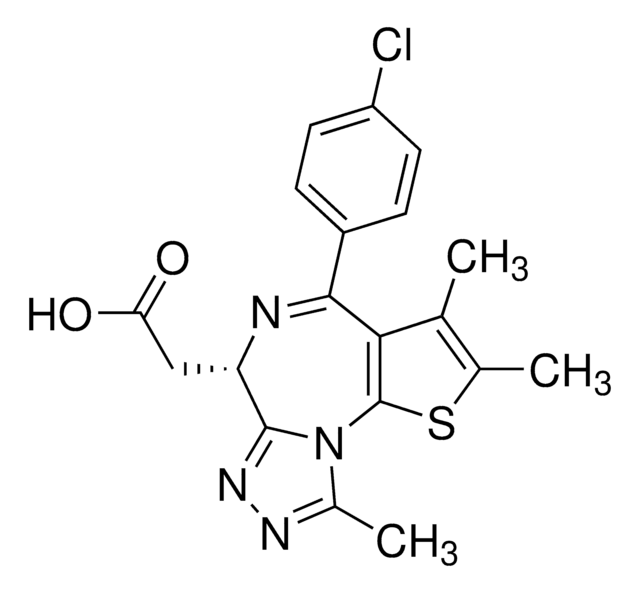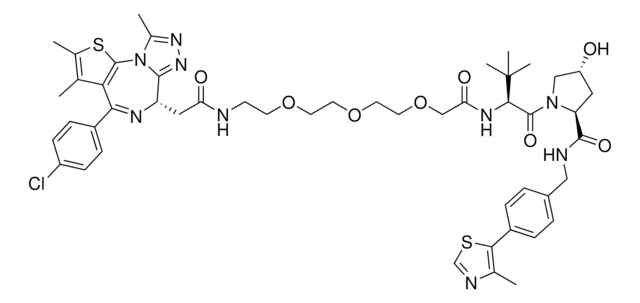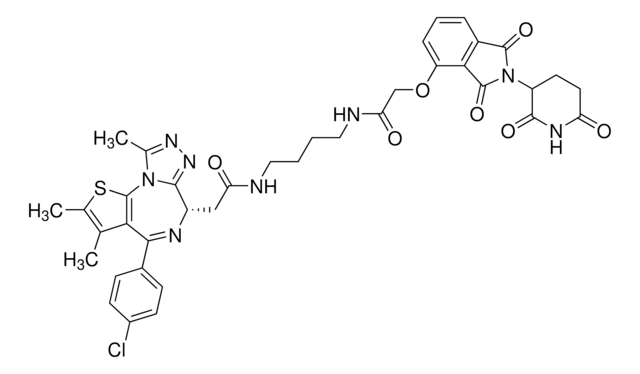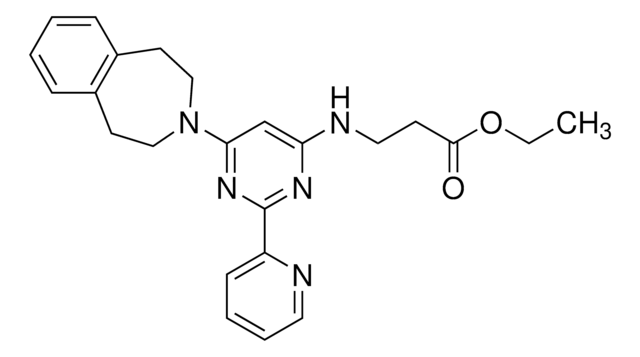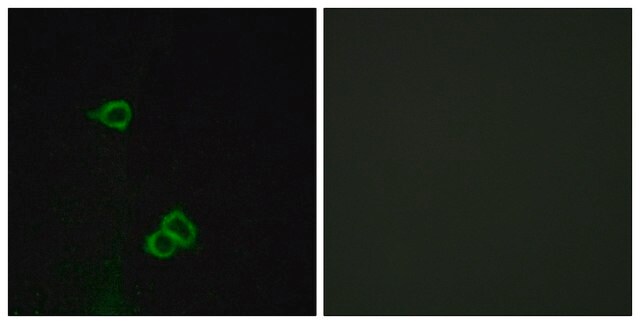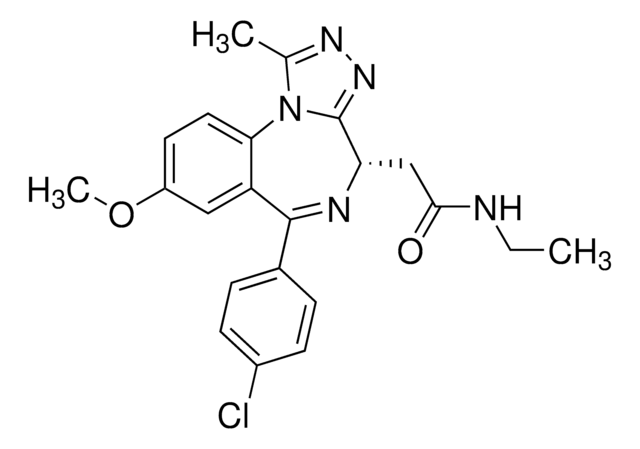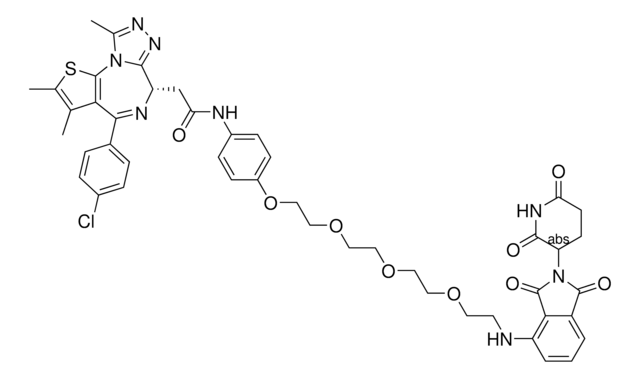SML2923
ARV-771
≥98% (HPLC)
Synonym(e):
JQ1-VHL
Anmeldenzur Ansicht organisationsspezifischer und vertraglich vereinbarter Preise
Alle Fotos(1)
About This Item
Empirische Formel (Hill-System):
C49H60ClN9O7S2
CAS-Nummer:
Molekulargewicht:
986.64
MDL-Nummer:
UNSPSC-Code:
12352200
NACRES:
NA.77
Empfohlene Produkte
ligand
VH032
Qualitätsniveau
Assay
≥98% (HPLC)
Form
powder
Farbe
white to beige
Löslichkeit
DMSO: 2 mg/mL, clear
Lagertemp.
2-8°C
Verwandte Kategorien
Biochem./physiol. Wirkung
ARV-771 is a bromodomain and extraterminal (BET) proteins degrader with a HIF-1?-derived von Hippel–Landau (VHL) E3 ligase-binding hydroxyproline and a BET-binding triazolo-diazepine acetamide. ARV-771 induces BET proteins degradation in castrate-resistent prostate cancer (CRPC) cultures (BRD2/3/4 DC50 <5 nM; 22Rv1, VCaP & LnCaP95) and reduces downstream c-Myc transcription with 10-500-fold higher potency than JQ-1, OTX015, and dBET1. ARV-771, but not JQ-1 or OTX015, effectively downregulates CRPC androgen receptor (30-300 nM) and causes CRPC tumor growth retardation/regression in mice in vivo (30 mg/kg s.c.; 22Rv1 and VCaP).
Lagerklassenschlüssel
11 - Combustible Solids
WGK
WGK 3
Flammpunkt (°F)
Not applicable
Flammpunkt (°C)
Not applicable
Analysenzertifikate (COA)
Suchen Sie nach Analysenzertifikate (COA), indem Sie die Lot-/Chargennummer des Produkts eingeben. Lot- und Chargennummern sind auf dem Produktetikett hinter den Wörtern ‘Lot’ oder ‘Batch’ (Lot oder Charge) zu finden.
Besitzen Sie dieses Produkt bereits?
In der Dokumentenbibliothek finden Sie die Dokumentation zu den Produkten, die Sie kürzlich erworben haben.
Lu Zhang et al.
Molecular cancer therapeutics, 18(7), 1302-1311 (2019-05-09)
Proteolysis-targeting chimeras (PROTAC) are bifunctional molecules that hijack endogenous E3 ubiquitin ligases to induce ubiquitination and subsequent degradation of protein of interest. Recently, it has been shown that PROTACs with robust in vitro and in vivo activities and, in some
Neeraj Jain et al.
Science translational medicine, 11(497) (2019-06-21)
The activated B cell (ABC-like) subtype of diffuse large B cell lymphoma (DLBCL) is characterized by chronic activation of signaling initiated by immunoglobulin μ (IgM). By analyzing the DNA copy number profiles of 1000 DLBCL tumors, we identified gains of
Jonathan M Cooper et al.
Clinical cancer research : an official journal of the American Association for Cancer Research, 25(11), 3404-3416 (2019-02-24)
BET bromodomain inhibitors have emerged as a promising therapy for numerous cancer types in preclinical studies, including neurofibromatosis type 1 (NF1)-associated malignant peripheral nerve sheath tumor (MPNST). However, potential mechanisms underlying resistance to these inhibitors in different cancers are not
Dyana T Saenz et al.
Leukemia, 33(6), 1373-1386 (2018-12-24)
Transformation of post-myeloproliferative neoplasms into secondary (s) AML exhibit poor clinical outcome. In addition to increased JAK-STAT and PI3K-AKT signaling, post-MPN sAML blast progenitor cells (BPCs) demonstrate increased nuclear β-catenin levels and TCF7L2 (TCF4) transcriptional activity. Knockdown of β-catenin or
Daniel J Coleman et al.
Scientific reports, 9(1), 3823-3823 (2019-03-09)
The BET bromodomain protein BRD4 is a chromatin reader that regulates transcription, including in cancer. In prostate cancer, specifically, the anti-tumor activity of BET bromodomain inhibition has been principally linked to suppression of androgen receptor (AR) function. MYC is a
Unser Team von Wissenschaftlern verfügt über Erfahrung in allen Forschungsbereichen einschließlich Life Science, Materialwissenschaften, chemischer Synthese, Chromatographie, Analytik und vielen mehr..
Setzen Sie sich mit dem technischen Dienst in Verbindung.